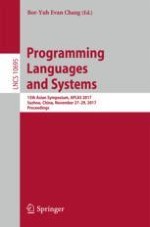2017 | OriginalPaper | Chapter
Programming and Proving with Classical Types
Authors : Cristina Matache, Victor B. F. Gomes, Dominic P. Mulligan
Published in: Programming Languages and Systems
Publisher: Springer International Publishing
Activate our intelligent search to find suitable subject content or patents.
Select sections of text to find matching patents with Artificial Intelligence. powered by
Select sections of text to find additional relevant content using AI-assisted search. powered by
